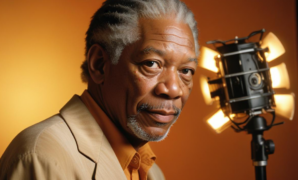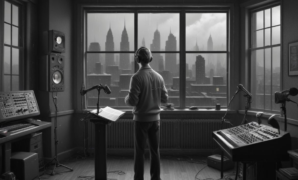Becoming a documentary narrator can be an exciting and rewarding career path for those passionate about storytelling and non-fiction filmmaking. […]
Category: Documentary Films
Documentary Films: Capturing Reality, Changing Perspectives
Documentary films serve as powerful tools for education, awareness, and social change. These non-fiction works capture real-life events, people, and issues, offering viewers a window into diverse experiences and perspectives. This article explores the world of documentary films, their types, production processes, and their impact on society.
What are Documentary Films?
Documentary films are non-fiction works that document aspects of reality, primarily for the purposes of instruction, education, or maintaining a historical record. Unlike narrative films, documentaries feature real people, places, and events, often addressing social, political, or environmental issues.
Types of Documentaries
Documentaries come in various forms, each with its unique approach to storytelling:
- Observational: Aims to observe subjects with minimal intervention.
- Example: “Grey Gardens” (1975)
- Expository: Uses a narrator to guide the viewer through the subject matter.
- Example: “March of the Penguins” (2005)
- Participatory: The filmmaker interacts with subjects on camera.
- Example: “Bowling for Columbine” (2002)
- Performative: Emphasizes the filmmaker’s subjective experience and emotional response.
- Example: “Tongues Untied” (1989)
- Poetic: Focuses on visual associations, tonal or rhythmic qualities, and patterns.
- Example: “Koyaanisqatsi” (1982)
- Reflexive: Calls attention to the process of filmmaking itself.
- Example: “Man with a Movie Camera” (1929)
The Documentary Production Process
Creating a documentary involves several stages:
1. Research and Development
- Identifying and researching the subject
- Developing the concept and approach
- Securing access to subjects and locations
2. Pre-production and Planning
- Creating a treatment or outline
- Budgeting and securing funding
- Planning the shooting schedule
3. Filming and Interview Techniques
- Capturing footage of events, people, and places
- Conducting interviews with subjects
- Gathering B-roll and supplementary material
4. Post-production and Editing
- Reviewing and organizing footage
- Crafting the narrative structure
- Adding music, graphics, and voice-over if necessary
Storytelling in Documentaries
Effective storytelling is crucial in documentaries:
- Narrative Structures: Can be chronological, thematic, or character-driven
- Use of Archival Footage: Incorporates historical material to provide context
- Voice-over and Narration: Guides the viewer through complex information
- Interview Styles: Ranges from formal sit-downs to casual conversations
Impact and Ethics in Documentary Filmmaking
Documentaries often aim to create social change, raising important ethical considerations:
Social and Political Impact
- Raising awareness about issues
- Influencing public opinion and policy
- Inspiring grassroots movements
Ethical Considerations
- Ensuring fair representation of subjects
- Navigating the filmmaker’s responsibility to subjects and audience
- Balancing storytelling with factual accuracy
Objectivity vs. Subjectivity
- Striving for fairness while acknowledging inherent biases
- Transparency about the filmmaker’s perspective
Technology in Documentary Filmmaking
Advancements in technology have revolutionized documentary production:
- High-quality, affordable digital cameras
- Drone footage for unique perspectives
- Advanced editing software for complex storytelling
- Virtual Reality (VR) for immersive documentary experiences
Distribution and Reach
The landscape for documentary distribution has expanded:
- Theatrical releases for high-profile documentaries
- Television networks dedicated to factual programming
- Streaming platforms providing wider access to documentaries
- Film festivals showcasing new and innovative documentary work
Notable Documentary Filmmakers
Many filmmakers have made significant contributions to the genre:
- Errol Morris (“The Thin Blue Line”)
- Werner Herzog (“Grizzly Man”)
- Agnes Varda (“The Gleaners and I”)
- Frederick Wiseman (“Titicut Follies”)
- Ava DuVernay (“13th”)
The Future of Documentary Films
The documentary form continues to evolve:
- Interactive documentaries allowing viewer participation
- Episodic documentary series on streaming platforms
- Use of animation and reenactments in hybrid forms
- Increased focus on diverse voices and perspectives
Documentary films play a vital role in our society, offering insights into the world around us, challenging our perspectives, and often inspiring action. Whether exposing injustices, celebrating human achievements, or simply observing the extraordinary in the ordinary, documentaries continue to push the boundaries of storytelling and impact. As technology advances and new voices emerge, the future of documentary filmmaking looks brighter and more diverse than ever.
Resources for Aspiring Documentary Narrators
Embarking on a career in documentary narration can be both exciting and challenging. As we’ve explored in our overview of […]
Case Studies: Iconic Documentaries and Their Narrators
In the world of documentary filmmaking, the right narrator can elevate a film from informative to unforgettable. As we’ve explored […]
Technology and the Future of Documentary Narration
The world of documentary narration is on the cusp of a technological revolution. As we’ve explored in our overview of […]
Voice Training and Preparation for Documentary Narration
Mastering the art of documentary narration requires more than just a pleasant voice. It demands dedicated training, meticulous preparation, and […]
Types of Documentary Narration Styles
Documentary narration is an art form that has evolved significantly since the early days of filmmaking. As we explored in […]
The Process of Selecting a Narrator for a Documentary
Selecting the right narrator for your documentary is a crucial decision that can profoundly impact the overall quality and reception […]
Famous Documentary Narrators and Their Techniques
The power of a compelling narrator can elevate a documentary from informative to unforgettable. As we’ve explored in our overview […]
The Art of Documentary Narration
Introduction to Documentary Narrators Documentary narrators are the unseen guides who lead viewers through the intricate landscapes of non-fiction storytelling. […]






